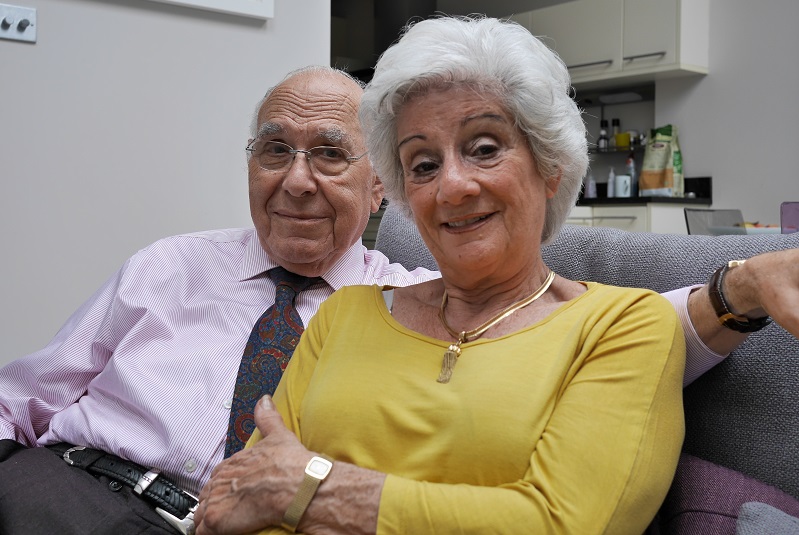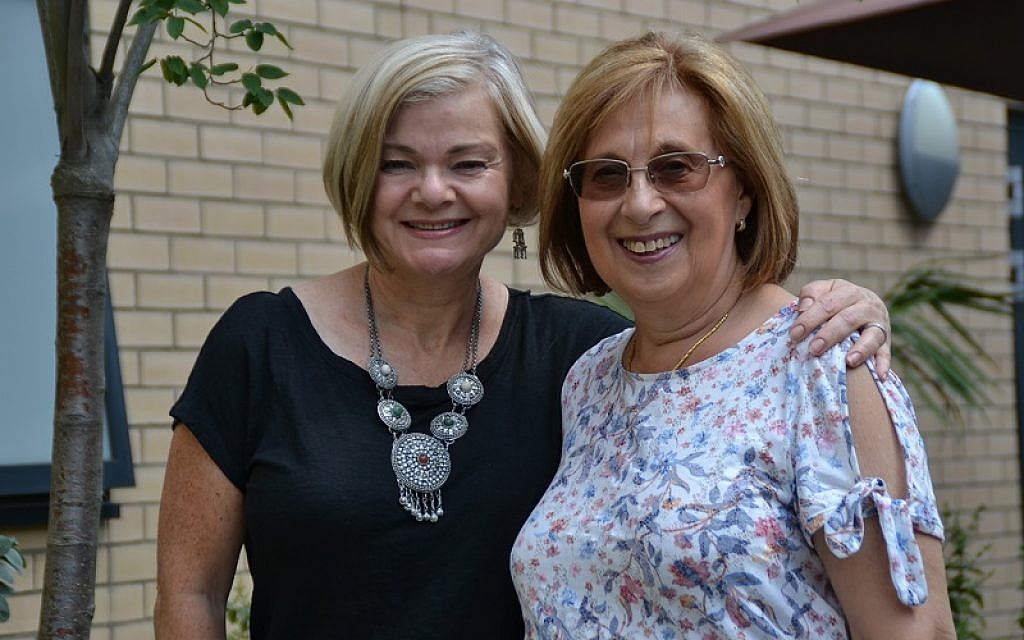Why talking about the ‘D’ word is so important
Francine Wolfisz finds out how Jewish Care's music sessions are helping people living with dementia, which affects more than 850,000 in the UK
Their words may be few and far between, their memories gradually disappearing – and yet Susan Dawson has seen for herself how playing the familiar refrains of a song from years gone by can dramatically help people living with dementia.
Susan, who heads up Jewish Care’s community dementia project, has witnessed the incredible power of music while running weekly Singing For Memory sessions at the charity’s Otto Schiff care home in Golders Green.
One participant, she recalls, would sit very quietly and seemingly not join in with the rest of the group.
Get The Jewish News Daily Edition by email and never miss our top stories Free Sign Up
“But then, when the singing stopped and the circle was quiet, he would suddenly stand up and break into an operatic aria.
“He had taken part in amateur dramatics and was a member of his synagogue choir for many years. The session gave him the opportunity to be his old self and perform once more,” says Susan, who has worked for Jewish Care over the past 10 years.
She has witnessed couples standing up and dancing together for the first time in many months, perhaps even years.
One man came up to her after a session to tell her how “lively and engaged” his wife is when she visits the centre.
“I see her come back to me when she’s here,” he smiled.
The Singing For Memory sessions and regular Memory Cafes are just two of the ways Jewish Care is helping to support people with dementia and their families.
There are currently more than 850,000 people diagnosed with the condition in the UK, with experts predicting this could rise to one million by 2021.
Dementia is an umbrella term for more than 200 progressive conditions that affect the brain, with the five most common being Alzheimer’s disease, vascular dementia, dementia with Lewy bodies, frontal lobe dementia and mixed dementia.
Aside from memory loss, dementia can greatly affect concentration, the ability to speak and carrying out daily tasks, but those in the progressed stages of the condition are still welcome to the weekly music sessions.
Susan explains: “Even people with advanced dementia who hear a tune will have a visceral reaction. Their eyes will light up; they may even smile.
“Many studies have proven a deep-rooted link between music and memory and, while they may not have heard a song for 20 or 30 years, if they regularly sang it as a younger person, the tune will stay embedded in their mind and they will remember the words.
“It’s a very powerful, very emotional thing to bring music to people and see how it has affected them.”

Among those helping out at the weekly Singing for Memory sessions and Musical Cafes run by Jewish Care is Sue Soloway, a long-time volunteer from Ruislip, who was recently diagnosed herself with dementia.
The 71-year-old, who has two sons and five grandchildren, began seeing a specialist after her family noticed she was experiencing memory problems.
She was finally diagnosed earlier this year with frontal lobe dementia, a less common type of the condition.
Sue’s mother, Bessie, and her two aunts, also experienced dementia in their later life. Despite this, Sue remains positive and determined to “just carry on”.
With a beaming smile, as she tells me about her family, she says: “Enjoy your grandchildren, enjoy your life and be happy. I’m very lucky to have such a lovely life.”
Supported by her husband Stuart, Sue – who was a long-time volunteer co-ordinator for Norwood – continues to assist with the weekly sessions held at the Jewish Care Otto Schiff care home in Golders Green.
“The people who come along join in with our sing-a-long of songs from the ’40s and ’50s and they love to be there. It’s a very positive thing to do and wonderful to see how music can help others.”
She admits not wanting to talk about dementia, but believes that greater awareness could help others better cope with close relative or friend experiencing symptoms.
“I’m not always a talkative person, but when it comes to this, I am going to open up about it because people need to know,” says Sue resolutely.
“The condition is far more widespread than people realise and there are many who have not yet been diagnosed. It can only help if we do become more aware and more open about it.”
In addition to running these support groups, Jewish Care runs a number of centres and care homes specialising in dementia care.
Hans Alter, 85, is now in the advanced stages of Alzheimer’s disease, having been diagnosed four years ago.
He used to attend activities at Michael Sobell Jewish Community Centre in Golders Green but, as his condition progressed, he moved into Kun Mor and George Kiss Home in Friern Barnet, which offers music therapy to residents living with dementia.
Hans’ wife, Anita, 81, who attends a reminscence group with him at The Betty Asher Loftus Centre, talks openly about the difficulties she faced in trying to look after him herself before he finally moved to a care home, and confesses “it’s much worse for us than it is for him”.
The grandmother-of-four tells me: “When he was diagnosed in 2014, he said he could deal with it, not knowing what was ahead of him – of course, neither did I.
“He began repeating himself and forgetting what he had just said. My husband was a well-educated man, who knew a lot about music, was very chatty and liked to tell jokes. Slowly but surely he got worse.
“His personality totally changed and it became very difficult for me.”
Fearing the task was overwhelming their mother, Anita’s two sons urged her to have Hans assessed for a care home.
Now settled into the Kun Mor and George Kiss Home, Anita visits her husband regularly and they speak together in their native Dutch.
“He doesn’t always make sense, but he still knows who I am, he knows my name.
“My husband was always very good to me and he was a lovely man. I feel dreadfully sorry for him, but there are times when I feel it’s much worse for us than it is for him. It’s like a cloud living over my head.
“Sometimes I feel like a widow with a husband. You eat alone, you decide everything alone, you have to make the best of it. That is life now.”
Reflecting on what advice she would give to other carers, Anita says: “Alzheimer’s affects not just the person with it, but everyone around them. Be honest about how you feel and have somebody to talk to.”
Susan from Jewish Care’s community dementia project agrees that the first step to dealing with dementia comes from having an open conversation.
“People are often reluctant to name the ‘D’ word, but they should not be afraid of speaking to a family member about their concerns, while also acknowledging they are probably distressed and anxious about what is happening to them.
“Get as much information as you can about the illness, get support for yourself and try to help your loved one get a diagnosis.
“The sooner you start having these difficult conversations, the easier it will be to get them the help they need.”
For advice or information about the wide range of support services on offer for people living with dementia and their carers, email Jewish Care via helpline@jcare.org or call 020 8922 2222.
How to support people living with dementia
- See them as a person, not as the condition
- Step into their world, try not to correct them
- Try to understand what they are feeling, not just what they are saying
- Too many choices can be overwhelming
- They are living with, not suffering from dementia
- Support them to continue their roles in work, family and the community and keep their interests going as much as possible
- Don’t struggle on your own; be open with professionals, friends and family and ask for support
Listen to this week’s episode of the Jewish Views Podcast!

Thank you for helping to make Jewish News the leading source of news and opinion for the UK Jewish community. Today we're asking for your invaluable help to continue putting our community first in everything we do.
For as little as £5 a month you can help sustain the vital work we do in celebrating and standing up for Jewish life in Britain.
Jewish News holds our community together and keeps us connected. Like a synagogue, it’s where people turn to feel part of something bigger. It also proudly shows the rest of Britain the vibrancy and rich culture of modern Jewish life.
You can make a quick and easy one-off or monthly contribution of £5, £10, £20 or any other sum you’re comfortable with.
100% of your donation will help us continue celebrating our community, in all its dynamic diversity...
Engaging
Being a community platform means so much more than producing a newspaper and website. One of our proudest roles is media partnering with our invaluable charities to amplify the outstanding work they do to help us all.
Celebrating
There’s no shortage of oys in the world but Jewish News takes every opportunity to celebrate the joys too, through projects like Night of Heroes, 40 Under 40 and other compelling countdowns that make the community kvell with pride.
Pioneering
In the first collaboration between media outlets from different faiths, Jewish News worked with British Muslim TV and Church Times to produce a list of young activists leading the way on interfaith understanding.
Campaigning
Royal Mail issued a stamp honouring Holocaust hero Sir Nicholas Winton after a Jewish News campaign attracted more than 100,000 backers. Jewish Newsalso produces special editions of the paper highlighting pressing issues including mental health and Holocaust remembrance.
Easy access
In an age when news is readily accessible, Jewish News provides high-quality content free online and offline, removing any financial barriers to connecting people.
Voice of our community to wider society
The Jewish News team regularly appears on TV, radio and on the pages of the national press to comment on stories about the Jewish community. Easy access to the paper on the streets of London also means Jewish News provides an invaluable window into the community for the country at large.
We hope you agree all this is worth preserving.
-
By Brigit Grant
-
By Laurent Vaughan - Senior Associate (Bishop & Sewell Solicitors)
-
By Laurent Vaughan - Senior Associate (Bishop & Sewell Solicitors)
-
By Laurent Vaughan - Senior Associate (Bishop & Sewell Solicitors)
-
By Laurent Vaughan - Senior Associate (Bishop & Sewell Solicitors)






















